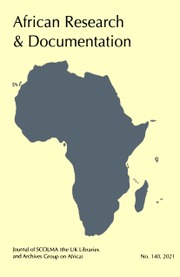No CrossRef data available.
Article contents
The Usages of the past: African historiographies since independence
Published online by Cambridge University Press: 25 April 2022
Extract
“I did history at school, but that was events, not the real things in Mantsoba's prophesies”.
[David Coplan 2002]During the recent past poststructuralist and postmodernist era it has become fashionable to think of continents, communities, identities, belonging, tradition, heritage and home as imagined, invented or created entities. The idea of Africa has been tantalising to the West ever since Aristotle in his Historia Animalium reported to the effect that ‘a certain proverb [paroimia] is current that Libya always produces something new - aei Libye pherei ti kaino.’
- Type
- Research Article
- Information
- Copyright
- Copyright © African Research & Documentation 2004
Footnotes
An earlier version of this paper appeared in Afrika Zatnani Nos. 7 & 8, 1999-2000, pp. 41-89.




